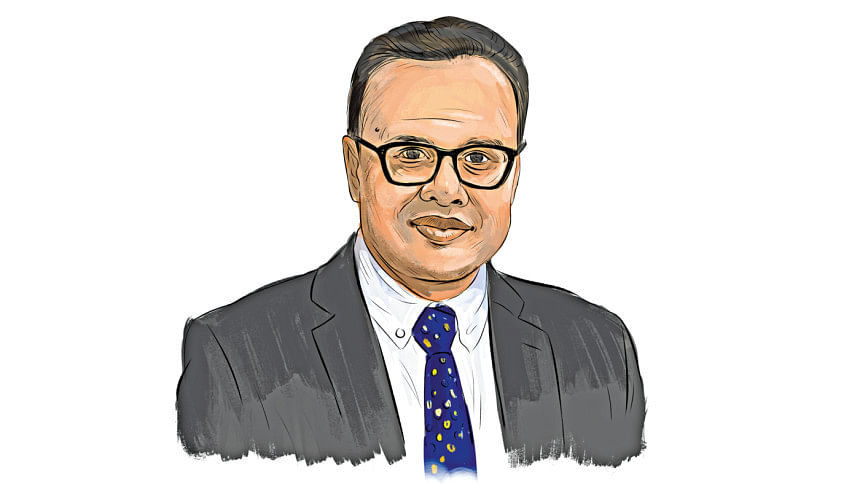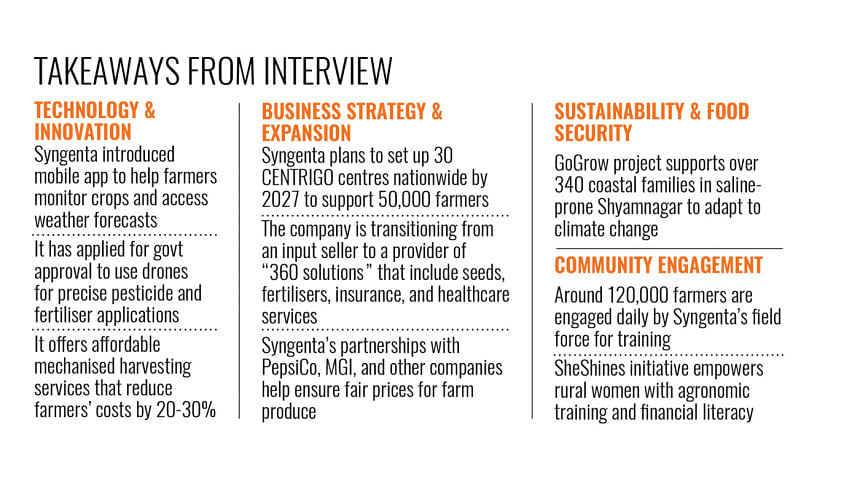Smart farming: Drones and AI to drive yield gains

In order to feed a growing population with ever-diminishing farmland, the country's agriculture has undergone a notable transformation since independence, buoyed by high-yielding varieties, chemical fertilisers, and pesticides.
Now, technologies such as drones and artificial intelligence in farming can play a role in increasing productivity further and promoting sustainability.

But challenges remain, ranging from erratic weather and fluctuating crop prices to limited awareness among farmers about quality seeds and pesticides, as well as the recent devaluation of the local currency, taka, according to Hedayet Ullah, managing director of Syngenta Bangladesh Limited.
In an interview with The Daily Star, Hedayet said that Bangladesh, like many of its Asian neighbours, is shifting from subsistence farming towards a more commercial model.
"It is a transformation from manual labour to mechanisation, from broadcasting pesticides to precision spraying, and from traditional farming methods to data-driven approaches using AI," said Hedayet.
To facilitate this transition, he said Syngenta Bangladesh is offering low-cost harvester services to help farmers adapt to mechanisation. "We want them to get comfortable with the technology," he said.
The leading local agri-input maker recently launched the "CropWise Grower" mobile app, allowing farmers to diagnose crop issues, monitor weather forecasts, and take timely action.
Headquartered in Switzerland, Syngenta globally supports millions of farmers in producing safe, nutritious food while caring for the environment.
In Bangladesh, Syngenta AG Switzerland holds a 60 percent stake in the joint venture, while the remaining 40 percent is owned by the government through the Bangladesh Chemical Industries Corporation (BCIC).
The company has been operating in Bangladesh for more than five decades.
According to Hedayet, Syngenta Bangladesh is committed to constant innovation to empower farmers, enhance sustainability, and contribute to food security.
As part of this strategy, the company has applied for government approval to use drones for tasks such as pesticide spraying and fertiliser application, which will ensure more accurate and safe usage.
Meanwhile, the company plans to set up 30 "CENTRIGO Centres" in major agricultural areas by 2027, with the goal of bringing 50,000 farmers under its agri-ecosystem platform.
"This model helps farmers improve productivity, cut down risks, and increase profits through sustainable, profitable farming practices," said the Syngenta Bangladesh managing director.
He said the success of this expansion depends on growing its network of value chain partners. "We are not just selling inputs; we are offering farmers a full-circle solution."
Syngenta's current partners include global and local firms such as PepsiCo Inc, New Zealand Dairy Products, Nourish Poultry Hatchery Limited, Bombay Sweets & Co, and Meghna Group of Industries. These partnerships help ensure farmers receive fair prices for their produce.
CENTRIGO, launched in Bangladesh in May 2022, is Syngenta's end-to-end agricultural model, designed to bring all essential services under one umbrella.
Hedayet said some 13 centres have already been set up, engaging nearly 13,000 farmers across the country.
"The platform builds confidence among both producers and consumers about the origins of food, while simultaneously advancing sustainability and food security," he added.
Through CENTRIGO, farmers can access quality seeds, fertilisers, crop protection solutions, insurance, collateral-free loans, telemedicine, and mechanised services including combined harvesters.
"These services enable farmers to harvest rice and wheat at the right time, reducing costs by 20 to 30 percent," said Hedayet. "By cutting production costs and shielding against weather-related losses, we are helping them raise yields and lighten their financial load."
He commented that Syngenta's mission includes creating better market access for farmers and encouraging meaningful partnerships across the agricultural value chain.
The managing director said Syngenta's field teams interact with around 120,000 farmers daily, sharing expert guidance through regular meetings and hands-on sessions.
Each year, the agri-input manufacturer also educates some 45 lakh farmers through its training programme, focusing on the safe and responsible use of crop protection products, pollinator conservation, and environmentally friendly practices.
However, with an estimated 2,500 to 3,000 hectares of farmland lost annually to non-agricultural use, future food security remains a serious concern, especially with the population continuing to rise while cultivated land shrinks, Hedayet said.
Apart from CENTRIGO, Syngenta Bangladesh is rolling out several sustainability initiatives aligned with global goals of "improving rural prosperity" and "regenerating soil and nature."
One such initiative is the "GoGrow" project, which aims to combat the effects of climate change in the saline-prone southern coastal belt, especially in Shyamnagar of the south-western district of Satkhira.
The project, run in partnership with the Bangladesh Institute of Nuclear Agriculture and the Department of Agricultural Extension's Smallholder Agricultural Competitiveness Project, currently supports more than 340 families farming across 326 acres of salt-affected land.
Another recent initiative is "SheShines," which is designed to empower rural women with agronomic knowledge, financial literacy, and entrepreneurial skills.
Hedayet said that Syngenta has teamed up with the local government at Sardah in Rajshahi to build the country's first "Farmer School" to address widespread knowledge gaps in farming communities.

 For all latest news, follow The Daily Star's Google News channel.
For all latest news, follow The Daily Star's Google News channel. 



Comments